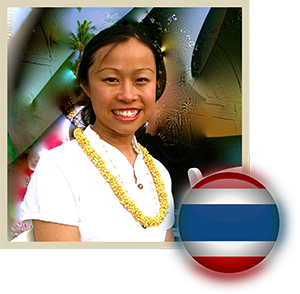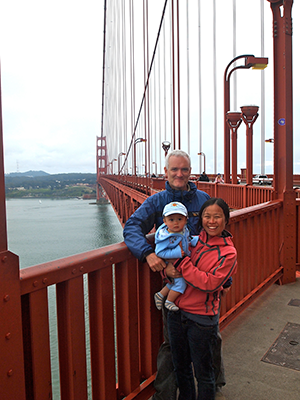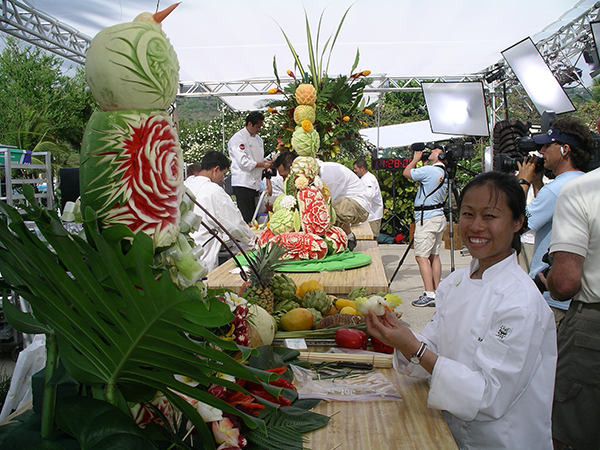Toi from Chiang Mai, Thailand
 The other day I got the chance to ask Toi from Thailand quite a few questions and she was so nice to really expand on them, giving you a lot of insight into the Thai culture and her experiences in the US. As always, the expat interview is not only interesting for people with the same nationality, but for all other expats or future expats, too. There’s a lot of great information, so please enjoy reading.
The other day I got the chance to ask Toi from Thailand quite a few questions and she was so nice to really expand on them, giving you a lot of insight into the Thai culture and her experiences in the US. As always, the expat interview is not only interesting for people with the same nationality, but for all other expats or future expats, too. There’s a lot of great information, so please enjoy reading.
Where are you from originally and how long have you been living in the United States?
I was born and raised in the second biggest city of Thailand called Chiang Mai and I have been living in the USA since mid November 2004.
Why did you decide to move to America and what do you do?
Good questions. When I got an invitation from my husband (fiancé at the time) I had a hard time finding a reason why I should move to the USA beside to be with him. I loved my job as a cooking instructor/teacher for foreigners. And all of my family members were near me. I have a close relationship with my family, so it was hard for me to think about living far away from them. I had a lot of reasons for not to come, but I then realized the “why not” was the only reason for me to accept the invitation and that was it.
How did you get your visa/greencard? Tell us a little bit about this process.

Road trip to San Francisco, CA in 2011
My husband helped me with the visa application. We did a K1 fiancé’ visa. He helped me with the paperwork; we used a book from a law-firm to help with research called Fiancé & Marriage visas (Nolo). He did most of everything. The process was not too hard, because the US government has a guideline and resource, forms that have all instruction in it. I got married to the US citizen and after we got married, we then filed some more paperwork to change my visa status to a permanent resident (greencard). Then I waited some more about 3-4 months until the greencard arrived.
What was the most difficult part of your immigration?
For me, it was about overcoming the fear of the unknown. Starting a life over from zero with very little understanding in English, except food conversations, was hard. And I already had a job I loved, close relationships with my family and good longtime friends, what made it even more difficult to let go of everything.
Is there anything that you miss from home other than family?
I sometime miss rice fields, smells of rain, some native Thai fruits and vegetables that they don’t seem to be able to export, mom’s baby jackfruit curry with pork short rib and her northern bamboo shoot soup that I cannot get anywhere else in the world that taste just like it.
What techniques worked best for you to learn English?
Reading out loud and asking people to correct me, when I said something wrong.
You’re a chef and cooking instructor. What do you think of American food and their eating habits? What would you change from a Thai cuisine perspective?
American life style, food and habits of eating are different from Thailand for sure. Mostly I think because the US is so big and diverse, people come from all over the world to live in the US, so I don’t think it’s fair to say one way or another about American food if it’s good or bad. It’s because when you say Americans, it means everyone from many ethnics. It can be Italian-Americans, Korean-Americans, Jewish-Americans, Arabian-Americans, native-Americans and more. When we are taking about food, it’s huge. Modern American foods that get served in restaurants nowadays are influenced by other cuisines. Of course the busy lifestyle makes people choose fast food for easy meals, but not all fast food is bad. We just need to understand our food some more, that’s all.
Geographical only some parts of the country can produce food. Limited space and time for produce food, some areas have short summers and long winters, so food here gets processed to different forms to preserve it, and some are imported from other countries. Refrigeration is big and most people are shopping for fresh ingredients so few times a week. We don’t always know about our food.
Another thing is the big portion size of food here, so over-eating is always a long-term health problem that the country will have to face as a whole and that will cost our insurance-healthcare a high price.
And the question “What would you change from a Thai cuisine perspective?” that’s a great question. It’s really hard to think about changing to this custom. Eating and food is the big thing, I would not try to change what habits people have about food and eating. Though I would encourage people to think a little bit more about what we are putting in our mouth. Is it fresh? Is it safe? If we ate too much what will happen to our bodies? I found out that some people don’t really know that fat in food is not a bad thing. Some people try so hard to avoid fat. They don’t realize that food in all forms, carbohydrates and proteins without any fat are still going to make you fat when you eat more than you use for energy. And of course no matter how hard they avoid fat they still get fat because they ate too much. So understanding foods and our bodies are important things to be aware of.

Food Network competition in Hawaii (2006).
What are the biggest differences between every day life in Thailand and America?
I have to say individualism and single-family are the most different perspective compared to a Thai family structure. In Thailand at least my family anyway, we know almost everything from everyone including extended family like cousins and second cousins and sometimes more about what’s going on in their lives. It’s a big family I guess; I used to live in a house that had 14 people (3 generations, grandparents, moms-dads and their children) in it. I had to live with my cousin’s wife and her family during my college years, because their house was very close to the university and it saved me from spending money for a dorm room. They also had to keep an eye on me for my parents. It was a win-win for my parents and my cousin’s family because I actually had to help out with cooking, cleaning or babysitting the children in the house. I loved the extended family that I had.
We don’t need to make an appointment way ahead of time like in the US. If I want to see family or friends, one phone call and a few minutes or hour from the call then I see them soon after. My aunt often came to see my mom without notice and mom’s happy to see her every time. There’s always short notice and there’s always welcome kind of thing. We had a “we” more, in my opinion, though I realized not all families are the same. If you ask other Thais, maybe it would be different. Here in the US I feel a sense of “mine and yours” is more. People think more of what privacy means, when it’s good or not a good time to call. Appointments had to be made way ahead of time before seeing each other, even if we live next-door to each other.
Have you experienced some kind of culture shock in America? Please tell us about it.
It’s a good question and I think it depends on where we look at. I didn’t have an expectation about the USA before I moved, so I thought it’s different. I just had to accept it. That’s all I thought. I didn’t like how food portion is big and I still don’t like it, but that’s because I’m not a fan of leftover food. I had always felt strange as a new immigrant when we ordered food – one entrée and one salad for the two of us. Because the portion is so big and I didn’t want to take home the leftover, beside waiter/waitress would ask, “Is that all?” and looked at us in a strange way.
I had to learn how to use a map all over again because Smartphones were not available when I first moved. In Thailand we drive on the left lane, which is the opposite side of driving in the US. That was a difficult one.
Going grocery shopping once a week and plan meals ahead of time was difficult for me and is still difficult for me sometimes.
My mom, these days and age, she still goes to get her fresh ingredients twice a day. What she makes is based on what’s fresh and what’s available. I was raised that way and I lived with that concept for almost 30 years before I moved here. Do you see what I mean?
If you were financially independent and could live anywhere you want in the U.S., where would you be and why?
It’s a hard question, that I honestly have not thought about yet. USA is a big country. I like to see them all before I can think about my dream place to live. My family is traveling a lot and everywhere we went was beautiful. I went to Hawaii, California, Louisiana, Utah, Wyoming, Alaska, Oregon, Washington, Idaho, Montana, Arizona, New Mexico, Texas, Georgia, Rhode Island, Massachusetts, New York and Puerto Rico. They are all beautiful and people were nice, so it’s hard to pick only one place plus I still have 33 more states to see before I can answer this question. Though I think there are some states that my mom could visit and still feel like Thailand, for example Southern California, New Orleans-Louisiana, Hawaii and Texas. These are places that I feel that the climate is similar to Thailand; I even saw same plants grow in these States.
When you go back to Thailand what things do you miss about the USA and what do you love seeing or experiencing about Thailand?
I don’t know if this is embarrassing but last year when I visited my family in Thailand I really missed trash cans. We have trash cans everywhere to put our trash in, but not many of them in Thailand.
You’ve been blogging at ExperienceMyJourney.com. Tell us a little bit about it.
The blog is mostly my travel log, when I go camping with my family. It’s for me to share my camping experience in national forests. It’s my first blog that I do mostly as a hobby. My last updated was a while back but you can still visit my archive to see my past travels like my Alaska Trip in 2012 travel with a 17 months old baby. I have some projects that I’m working on right now so I promise that I will update the blog when I can. I do have a second blog that I’m working on called NewCountryNewLife.com. It’s about life of immigrants in another country. Most of them are essays. Time is so limited for me, I want to blog more but with family, I work on it when I can. They both are still a hobby at this point. I’m still figuring things out what to do with my life I guess. Raising my kid is the number one priority for me and as much as I love blogging I still have to work on my time that would not conflict with family.
Tell me 3-5 things you would take back to Thailand from the USA.
When I went home last time I brought some perfumes, Colorado honey and Hershey chocolate bars. I heard a lot of people brought Levi’s jeans because it’s a popular item that the Thais like, but so far I have not done it yet. My family doesn’t care much about clothes.
And 3-5 things you think the USA should have/implement from Thailand.
It’s been a while since I have lived here; I honestly don’t know what the USA should have from Thailand. My last visit home I didn’t really explore or shop much. Thailand is known for affordable clothes. A lot of expensive sport clothes here in the USA, believe it or not, are made in Thailand, which if you know where to buy it in Thailand that would be very affordable. Also Thailand exports a lot of small electronic and auto-parts to other countries. We may have already used some of them here. My Sony voice recorder is made in Thailand.
What I wish I had is a green papaya grater that I had in Thailand. I found something similar here but they are not the same.
I wish I had my tailor here in the US or I wish we had more Thai tailors immigrate to the US. In Thailand tailors can get your clothes made in no time, if you want to have a suit made for you most of them can do it in 24 hours or a few days. It’s affordable to have tailors in Thailand but in the US, it’s next to impossible because of the cost of labor and also because it’s easier to buy clothes in the store even if they don’t fit right.
Food ingredients of course. There are too many things that cannot export out of Thailand unless they get transformed or frozen first. Some fresh one is not really quite fresh because they have to get harvested ways before they’re ready, so sometimes I just give up wanting to eat them. It’s next to impossible to have them grow out here in the US because we don’t have the exact same climate or native pest to control them and rule regulation about plants made it even more difficult to have them. There are some foods that I never get tired of eating when I go home, because I cannot get it here.
Any parting words or tips for future expats from Thailand?
Firstly, know your “why”. Why you want to immigrate to the US. Secondly know where you are moving to, how the climate is like, so you know what to expect. I knew that Colorado was going to be cold for me. I had to practice and spend some time in a hotel walk-in freezer to get myself used to the cold, so I knew that I could live in a cold weather. Thirdly, familiarize yourself with English. It’s possible to live in the US without speaking English or know little English, if you can find enough people speaking Thai. But your life will be much easier when you can communicate with Americans. Other than that, follow your intuition. If you don’t feel that the USA is your new home you can always go back to Thailand. If you feel that this could be your new home, it is a great opportunity to live a life with a great adventure. Learn to eat foreign food because you will miss your home food even though you can cook, ingredients are limited, and it will not be the same. Make friends. If anything goes wrong you can ask for help and also don’t forget that we have a Thai consulate here in the US. They speak Thai and they will be happy to help when you are in trouble. There’s nothing to be afraid of. Lastly, good luck with your new adventure if you decided to come to the US. It’s a great country; it’s my home now.

I'll send you updates about the latest posts about twice a month. On top of that you’ll get access to my Ultimate USA Tipping Guide as well as the Expat Cuisine eBook.





Leave a Reply